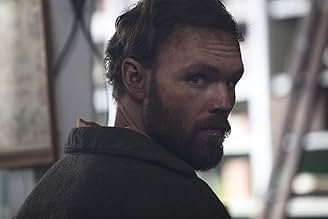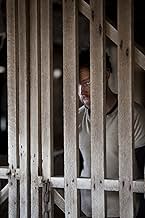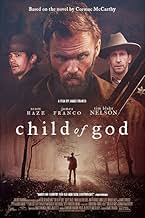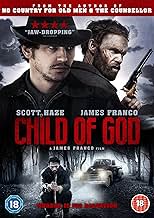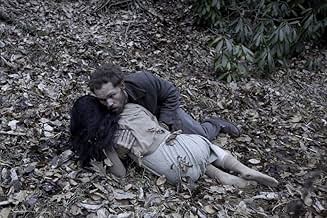PUNTUACIÓN EN IMDb
5,4/10
4,5 mil
TU PUNTUACIÓN
Es la historia de Ballard. Un joven, violento y desposeído, cuya vida es un intento desastroso por existir fuera del orden social.Desprovisto una y otra vez de lazos afectivos, desciende lit... Leer todoEs la historia de Ballard. Un joven, violento y desposeído, cuya vida es un intento desastroso por existir fuera del orden social.Desprovisto una y otra vez de lazos afectivos, desciende literal y metafóricamente al nivel de un cavernario.Es la historia de Ballard. Un joven, violento y desposeído, cuya vida es un intento desastroso por existir fuera del orden social.Desprovisto una y otra vez de lazos afectivos, desciende literal y metafóricamente al nivel de un cavernario.
- Dirección
- Guión
- Reparto principal
- Premios
- 2 premios y 1 nominación en total
Ciera Danielle
- Salesgirl
- (as Cierra Parrack)
Reseñas destacadas
I sat still after the United States premiere of James Franco's "Child of God" at the New York Film Festival, not as much contemplating whether or not it was good as I was considering whether or not I liked it. Mostly true to the Cormac McCarthy novel on which it was based, the film follows the cloistered and violent existence of Lester Ballard (Scott Haze) who lives isolated in the woods of Tennessee committing crimes of the most grotesque caliber. I won't say much more about the plot other than the fact that the sadistic actions shown on screen evoke an uneasy humor, a disturbing essence of comical brutality. To say the least, this movie is not for the queasy or the fainthearted. You will squirm.
Organization:
James Franco decided to organize the film into three acts, clearly distinguished from one another by title cards. While the producer argued this was done to manifest the passage of time, I felt it had no such effect. To add to this distortion of time and space, scenes are executed as vignettes. There's a constant transition fading in and out of the action, not only prompting confusion as to how much time passes between each scene, but also distracting the audience from the plot by means of excessive filmmaking. Some scenes exist solely for the purpose of character development while others seem to have no function at all. The relevant vignettes are strung together by a consistently distressed brain. While this structure may detract from the linear storyline, it instead leaves more up to interpretation and imagination. No number of scenes can embody the true insanity of Lester Ballard, we can only imagine what madness must be going on between the fades.
Performances:
Scott Haze's performance as Lester Ballard is probably the most memorable and noteworthy aspect of the film. Haze, who lived alone in caves and lost 45 pounds to prepare for this dynamic and challenging role, brilliantly expresses the complex lunacy of Ballard. He adjusted his voice to a barely comprehensible Tennessee accent and habitually licks his lips and bares his teeth, similar to Heath Ledger's Joker. Admitting that he channeled troubles from his own past when confronting the character, Haze often appears ignorant and childlike, constantly screaming and salivating, a repulsive portrait of a man bore from nature's womb. While sometimes funny, his interactions with his victims are unsettling yet strangely amorous. Just like in the writing of Cormac McCarthy, the audience lacks any sympathy for Ballard, for it's nearly impossible to relate to him. Franco isn't looking for your sympathy, he wants nothing more than your intrigue and attention. To witness Haze is to observe an animal, wild, vicious, and savage. The only other notable performance is that of Tim Blake Nelson playing Sheriff Fate. He conducted the role with a mediated honesty, constructing as realistic a character as possible and standing out within the frame, even with minimal screen time.
Technicalities:
All things considered, the technical aspects of the film are quite impressive. Funded out of James Franco's own pocket, the movie looks and sounds great considering its modest budget. The cinematography of the rural Tennessee landscape is eerily beautiful, shot hand-held on a handful of Canon 5Ds. The desaturated and gritty colors add an appropriate rustic feel to the film, further enhancing the forest terrain. The original music, although not particularly memorable, suits the setting well. Furthermore, the nameless narration was true to McCarthy's technique and certainly added to the tone of the film, keeping the audience attentive all the same. Overall, the movie's unsensational filmmaking is entirely fitting, ensuring the horrors on screen are ever more explicit, ever more real.
Conclusion:
You can tame the land, but you can't tame a man. "Child of God" is a commentary about the dispossessed in an incestuous homeland. Littered with existential imagery and dialogue, the film offers a respectful and honest rendering of the novel. While I may not agree with some storytelling elements and approaches, Franco still manages to get the point across and deliver a message, a testament to rejection, violence, and humanity. The film is definitely worth a watch if you can stomach it and works as a cogent visual supplement to the novel. I look forward to seeing more James Franco adaptations in the future.
Organization:
James Franco decided to organize the film into three acts, clearly distinguished from one another by title cards. While the producer argued this was done to manifest the passage of time, I felt it had no such effect. To add to this distortion of time and space, scenes are executed as vignettes. There's a constant transition fading in and out of the action, not only prompting confusion as to how much time passes between each scene, but also distracting the audience from the plot by means of excessive filmmaking. Some scenes exist solely for the purpose of character development while others seem to have no function at all. The relevant vignettes are strung together by a consistently distressed brain. While this structure may detract from the linear storyline, it instead leaves more up to interpretation and imagination. No number of scenes can embody the true insanity of Lester Ballard, we can only imagine what madness must be going on between the fades.
Performances:
Scott Haze's performance as Lester Ballard is probably the most memorable and noteworthy aspect of the film. Haze, who lived alone in caves and lost 45 pounds to prepare for this dynamic and challenging role, brilliantly expresses the complex lunacy of Ballard. He adjusted his voice to a barely comprehensible Tennessee accent and habitually licks his lips and bares his teeth, similar to Heath Ledger's Joker. Admitting that he channeled troubles from his own past when confronting the character, Haze often appears ignorant and childlike, constantly screaming and salivating, a repulsive portrait of a man bore from nature's womb. While sometimes funny, his interactions with his victims are unsettling yet strangely amorous. Just like in the writing of Cormac McCarthy, the audience lacks any sympathy for Ballard, for it's nearly impossible to relate to him. Franco isn't looking for your sympathy, he wants nothing more than your intrigue and attention. To witness Haze is to observe an animal, wild, vicious, and savage. The only other notable performance is that of Tim Blake Nelson playing Sheriff Fate. He conducted the role with a mediated honesty, constructing as realistic a character as possible and standing out within the frame, even with minimal screen time.
Technicalities:
All things considered, the technical aspects of the film are quite impressive. Funded out of James Franco's own pocket, the movie looks and sounds great considering its modest budget. The cinematography of the rural Tennessee landscape is eerily beautiful, shot hand-held on a handful of Canon 5Ds. The desaturated and gritty colors add an appropriate rustic feel to the film, further enhancing the forest terrain. The original music, although not particularly memorable, suits the setting well. Furthermore, the nameless narration was true to McCarthy's technique and certainly added to the tone of the film, keeping the audience attentive all the same. Overall, the movie's unsensational filmmaking is entirely fitting, ensuring the horrors on screen are ever more explicit, ever more real.
Conclusion:
You can tame the land, but you can't tame a man. "Child of God" is a commentary about the dispossessed in an incestuous homeland. Littered with existential imagery and dialogue, the film offers a respectful and honest rendering of the novel. While I may not agree with some storytelling elements and approaches, Franco still manages to get the point across and deliver a message, a testament to rejection, violence, and humanity. The film is definitely worth a watch if you can stomach it and works as a cogent visual supplement to the novel. I look forward to seeing more James Franco adaptations in the future.
I had no idea what to expect with Child of God. I haven't read the book but I have heard its quite disturbing. I had my skepticism because it could have easily been a disturbing movie just for the sake of being disturbing, but I had hope that James Franco would deliver something memorable, and he has!
Lester Ballard is a despicable man. Shouting and abusing anyone in his sights. Filthy, foul mouthed, psychotic, this is a man you wouldn't want to have a conversation with, and I was expecting just to have nothing but repulsive feelings when watching him on screen! But what makes the film work, is that Franco, although not condoning this man's behaviour, allows some humanity inside a person that everyone deemed as a lost cause. There was a strange beauty in this film that hid under all the ugliness.
The acting from Scott Haze is nothing short of amazing. Psychotic one second, to a crying mess the next. You have a whirlwind of emotions when dealing with this very dramatic character.
Be warned, the themes in this film are very extreme and will upset a lot of people, but I thought it had a purpose.
If you don't mind watching films that aren't afraid to show you the ugly side of life together with a strange sense of beauty, then Child of God comes recommended!
Lester Ballard is a despicable man. Shouting and abusing anyone in his sights. Filthy, foul mouthed, psychotic, this is a man you wouldn't want to have a conversation with, and I was expecting just to have nothing but repulsive feelings when watching him on screen! But what makes the film work, is that Franco, although not condoning this man's behaviour, allows some humanity inside a person that everyone deemed as a lost cause. There was a strange beauty in this film that hid under all the ugliness.
The acting from Scott Haze is nothing short of amazing. Psychotic one second, to a crying mess the next. You have a whirlwind of emotions when dealing with this very dramatic character.
Be warned, the themes in this film are very extreme and will upset a lot of people, but I thought it had a purpose.
If you don't mind watching films that aren't afraid to show you the ugly side of life together with a strange sense of beauty, then Child of God comes recommended!
well done, Mr. Franco. after watched this film, i have to say that you are indeed got something we called 'talent'. this film has put you in a totally different category and level. the original story created by the author of 'no country for old man' was such a weird one but in other word, a very very disturbing and sad one. we got a crazy, stone-cold bloody killer in 'no country for old man', now we got a half crazy, half idiotic lone-wolf-like loco hilly-billy roaming aimlessly day and night. we saw him gradually deteriorated, became crazier, became a more and more violent sociopath. he at first was not a rapist but was imprisoned as a rapist, that jail time had changed him into another unsalvageable rapist and a serial killer, an incurable social disease. Scott haze had successfully performed an Oscar level character, very convincing, very intense, very pitiful dejected person who step by step turned into a half human, half animal like tragic role. what made this novel and the adapted film unique is although the 'lester' guy did a lot of unthinkable crimes, we, the viewers, seemed not be able to hate him as we usually hate a vicious killer, murderer or a rapist. this character has gently affected us to sympathize him as a victimized victim. after watched this film, i have found that i could not judge or blame him as a bad person by all means, even he had caused lot of troubles and deaths, i seemed to still consider him as another kind of victim.
this is a great viewing experience.
this is a great viewing experience.
Based in the novel of the same name written by Cormac McCarthy (No Country For Old Men, The Road). This is very dark film and certainly not for everyone, but I would recommend it to cinephiles based on the incredible, visceral performance by Haze. He is Lester Ballard. As despicable and vile as his behavior is, there is buried within him a human quality. He just wants what all humans desire – to be accepted and loved.
The film sticks very closely to the book, with only 2 scenes expanded from the original text. It is most definitely one of the most faithful adaptations I've ever seen. The direction is fairly solid, the use of long takes and natural action is apparent, making everything on-screen seem genuine. All of the camera work is hand-held, which can be disorienting at times but it, in a way, adds to the aesthetic of the film. The music used is subtle yet appropriate. Overall, like I said , a very dark film with very strong subject matter, but it's well done.
The film sticks very closely to the book, with only 2 scenes expanded from the original text. It is most definitely one of the most faithful adaptations I've ever seen. The direction is fairly solid, the use of long takes and natural action is apparent, making everything on-screen seem genuine. All of the camera work is hand-held, which can be disorienting at times but it, in a way, adds to the aesthetic of the film. The music used is subtle yet appropriate. Overall, like I said , a very dark film with very strong subject matter, but it's well done.
James Franco seems to be trying to make a reputation for himself as a director who will tackle "classic novels" that were considered to be unfilmable, as he did with AS I LAY DYING. Let's say this about the Cormac McCarthy source novel, though. You will hear a lot of praise heaped upon it by the literary intellectuals. What you hear, though, is that the author has an original way with his prose, or that it's well known for a distinctive writing style that is missing common punctuation. What you don't usually hear is "this is a stunningly original and exciting story". It's the style that is praised more than the story.
That has an obvious effect on this movie, then, as you cannot translate the prose to the screen (though Franco tries by injecting voice- overs and on screen text containing actual excerpts). What you are left with is a story that isn't all that exciting and has been done plenty of times. Yes, the necrophilia angle takes it further than most movies are willing to go, but in the end, this is just another Ed Gein influenced horror tales. What it desperately needed was to have something more happen in the actual events of the story. There is very little actual action and very little occurs in this movie. Prepare yourself to spend a great deal of the run time following our main character as he wanders around in the woods talking to himself.
It is the main character and the acting by Scott Haze that is the central reason anyone would want to watch this movie. It is mainly a character study of one man, who we meet in the beginning clearly already suffering from mental illness. Through the course of the events of the story, we watch his mental health further degrade until he is little more than a primal animal, living in a cave and acting out his sexual deviances on whatever victims stumble his way. Haze does an excellent job of portraying this character, who mostly mumbles his way through the movie, putting the emphasis on Haze to portray the characters mental instability through his facial expression. The character could have become a cardboard cutout villain, but through the acting of Haze and some directing by Franco, the character definitely has his sympathetic moments where we feel for the situations that have put him down this course in life.
Ultimately, though, I was just bored through most of the movie. I don't mind artistic. I don't mind low budget. I don't mind experimental. I am not someone who just doesn't have a tolerance for this style of film making. Instead, the only real action is a botched lynching that he escapes from far too conveniently. I just kept waiting for something to happen and it never did, including a huge letdown ending.
That has an obvious effect on this movie, then, as you cannot translate the prose to the screen (though Franco tries by injecting voice- overs and on screen text containing actual excerpts). What you are left with is a story that isn't all that exciting and has been done plenty of times. Yes, the necrophilia angle takes it further than most movies are willing to go, but in the end, this is just another Ed Gein influenced horror tales. What it desperately needed was to have something more happen in the actual events of the story. There is very little actual action and very little occurs in this movie. Prepare yourself to spend a great deal of the run time following our main character as he wanders around in the woods talking to himself.
It is the main character and the acting by Scott Haze that is the central reason anyone would want to watch this movie. It is mainly a character study of one man, who we meet in the beginning clearly already suffering from mental illness. Through the course of the events of the story, we watch his mental health further degrade until he is little more than a primal animal, living in a cave and acting out his sexual deviances on whatever victims stumble his way. Haze does an excellent job of portraying this character, who mostly mumbles his way through the movie, putting the emphasis on Haze to portray the characters mental instability through his facial expression. The character could have become a cardboard cutout villain, but through the acting of Haze and some directing by Franco, the character definitely has his sympathetic moments where we feel for the situations that have put him down this course in life.
Ultimately, though, I was just bored through most of the movie. I don't mind artistic. I don't mind low budget. I don't mind experimental. I am not someone who just doesn't have a tolerance for this style of film making. Instead, the only real action is a botched lynching that he escapes from far too conveniently. I just kept waiting for something to happen and it never did, including a huge letdown ending.
¿Sabías que...?
- CuriosidadesScott Haze moved to Sevierville, TN, to prepare for the role of Lester Ballard. He lived in an isolated cabin in the woods, lost 50 pounds and was reportedly sleeping in caves some nights.
- PifiasLester seems to have an endless supply of bullets.
- Citas
[repeated line]
Lester Ballard: Get off my fuckin property!
- ConexionesFeatured in Filmselskabet: Episodio #4.1 (2013)
Selecciones populares
Inicia sesión para calificar y añadir a tu lista para recibir recomendaciones personalizadas
- How long is Child of God?Con tecnología de Alexa
Detalles
- Fecha de lanzamiento
- País de origen
- Sitios oficiales
- Idioma
- Títulos en diferentes países
- Tanrının Oğlu
- Localizaciones del rodaje
- Empresas productoras
- Ver más compañías en los créditos en IMDbPro
Taquilla
- Recaudación en Estados Unidos y Canadá
- 39.324 US$
- Fin de semana de estreno en EE. UU. y Canadá
- 27.630 US$
- 3 ago 2014
- Recaudación en todo el mundo
- 39.324 US$
- Duración1 hora 44 minutos
- Color
- Mezcla de sonido
- Relación de aspecto
- 1.85 : 1
Contribuir a esta página
Sugerir un cambio o añadir el contenido que falta

Principal laguna de datos
By what name was Child of God (2013) officially released in India in English?
Responde



